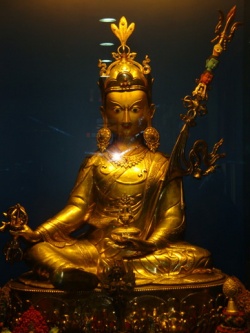Modes of Transmissions
According to Nyingma history, the three inner classes of tantra, Mahayoga, Anuyoga and Atiyoga, all derive ultimately from Samantabhadra, the primordial buddha-body of reality.
They have been transmitted down to the present day in three distinctive phases: the lineage of the enlightened intention of the conquerors, the lineage of the symbolic gestures of the awareness holders, and the lineage of aural transmission through exalted individuals.
Furthermore, there are two modes of transmission that are at work in Tibet: oral transmission, or Kama (bka’ ma) and revelation, or terma (gter ma).
The lineages of the three inner classes of tantra – Mahayoga, Anuyoga and Atiyoga – all derive ultimately from Samantabhadra – the primordial buddha-body of reality, the fundamental nature or actual reality of buddha-mind.
Manifesting in the realm of Great Akanistha, in the form of Vajradhara, endowed with all the signs and marks of buddhahood, Samantabhadra confers through the blessing of his enlightened intention,
the realization of manifestly perfect buddhahood upon the five buddhas (Vairocana and so forth) who preside over the assembly of the hundred peaceful and wrathful deities, and who assume the buddha-body of perfect resource, inseparable from himself.
This transmission is known as the lineage of the enlightened intention of the conquerors, and is therefore devoid of symbolic gestures or verbal expressions.
Simultaneously, in a special realm of Akanistha, the same blessing is conferred by the peaceful aspects of buddha-body of perfect resource – Vairocana and so forth – through symbolic gestures indicative of enlightened intention,
upon the most exalted bodhisattvas – Vajrapani, Avalokiteshvara and Manjughosa, each of whom is responsible for communicating these teachings symbolically to their respective followers – yaksas, nagas and devas.
Meanwhile, in lesser realms of Akanistha the wrathful aspects of the buddha-body of perfect resource confer the same blessing through the imperishable sound of pure vibration upon harmful beings – Rudra, Bhairava and so forth; and, in a lower realm known as the Abode of the Thirty-three Gods (Trayatrimsha),
the Buddha Vajrasattva bestowed the pith instructions of the Great Perfection upon his own emanation, Adhicitta, a divine being whose realization was also instantaneously born.
The first human recipient of this lineage is considered to have been the latter’s offspring – Prahevajra of Oddiyana, known in Tibetan as Garab Dorje (dga’ rab rdo rje).
In more conventional and terrestrial realms, such as Mt Malaya, Vajrapani then imparted the tantras symbolically to five exalted being, one of whom, Vimalkirti the Licchavi, was human.
These transmissions, whereby the teachings of the buddha-body of perfect resource are conferred on the buddha-body of emanation, are collectively known as the lineages of the symbolic gestures of the awareness-holders, and are therefore devoid of verbal expressions.
The three classes of tantra were thereafter transmitted in the human world through lineages established by exalted individuals, and their respective texts gradually established.
Among them, King Indrabhuti who had received the teachings from Vajrapani, and Vajrasattva transmitted the Mahayoga Tantras.
His successor Kukkuraja divided them into eighteen books.
The eight classes of sadhana based upon them fell to Humkara and so forth.
King Indrabhuti assumed the name Vyakaranavajra and, as such, he received the Anuyoga tantras from the aforementioned Vimalakirti, transmitting them in turn through Kambalapada, Prahevajra, Shakyaprabha (Prabhahasti), Shakyasimha (Padmasambhava), Dharanraksita, and Dharmabodhi.
The Atiyoga tantras are said to have been transmitted by Prahevajra through Manjushrmitra, who divided them into three classes, and Sri Simha who divided the pith instructions into four teaching-cycles.
In this transmission the buddha-body of emanation confers the teachings upon human beings by word and letter.
It is known as the lineage of the aural transmission through exalted persons. It continues down to the present day through an unbroken succession of oral teachings and spiritual revelations.
With regard to the class of spiritual revelations there are three additional modes of transmission that are considered to be orthodox. Among them, the lineage empowered by enlightened aspiration.
This includes those treasure finders who discover their appropriate revelations on the basis of the former enlightened aspirations of Padmasambhava and Yeshe Tsogyal (ye shes mtsho rgyal) that the indicated individuals will emerge in the future to reveal their respective treasures.
The lineage of prophetically declared spiritual succession includes those treasure-finders whose actual names or circumstances have been prophesized in the writings of Padmasambhava.
Finally, the [[lineage of the dakinis’ seal of entrustment]] includes those treasure-finders to whom the guardians of the treasures rightfully bequeath encoded texts, which they alone are able to interpret.

